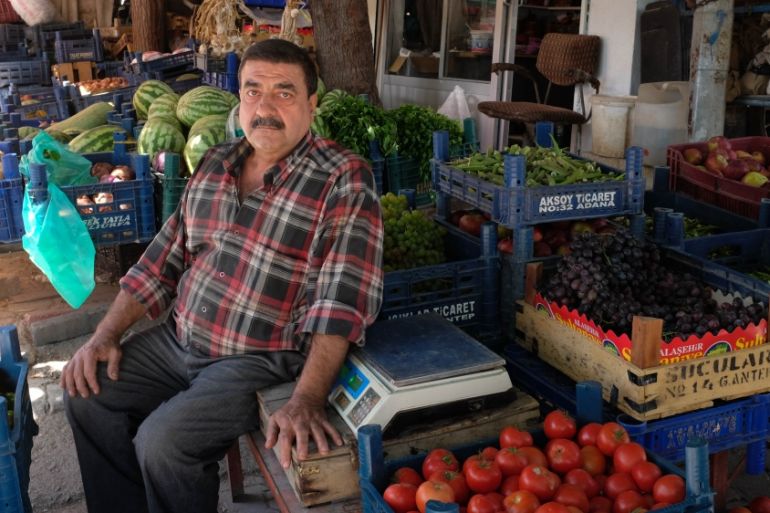Life in an ISIL firing zone on the Syria-Turkey border
With dozens of rockets landing in Kilis this year, some residents say they have become afraid to go outside.

Kilis, Turkey – Mehmet Oz was perched in his usual spot atop a table surrounded by pallets of plump grapes, tomatoes and peppers, when a rush of air lifted him off his seat.
The windows of a nearby building shattered, and a cup of tea flew threw through the air before smashing to the ground.
Keep reading
list of 4 itemsWorld Food Programme to end general assistance in northwest Syria
Erdogan open to meeting al-Assad but not to withdrawal from Syria
Middle East Roundup: What’s going on with Saudi Arabia and China?
Just around the corner from the Kilis market where 57-year-old Oz sells fruit, an incoming rocket fired by the Islamic State of Iraq and the Levant (ISIL, also known as ISIS) had careered into an alleyway.
“We heard the sound after they fired it, and five seconds later we heard the explosion,” Oz told Al Jazeera, noting that his family members, including his five children, no longer felt safe in the town.
“If I had a chance, I would run away,” Oz said. “But it is impossible.”
![One of the rockets fired on Thursday landed around the corner from this market [Megan O'Toole/Al Jazeera]](/wp-content/uploads/2016/09/8ea7ca589285496b99582514d9f573d5_18.jpeg)
‘I’m afraid for my children’
The rocket that struck near the market last Thursday was one of two that landed in Kilis that day, fired from ISIL-held territory across the border in Syria. Residents of Kilis – home to an estimated 200,000 people, more than half of whom are Syrian refugees – told Al Jazeera that more than 100 rockets had rained down on the town since January.
When pieces of the latest rocket smashed into the side of his clothing shop, local merchant Saoud Faour was away, but his two sons, aged 10 and 11, were both in the store. The eldest boy suffered a minor injury when shrapnel flew into his leg.
“His brother was afraid for him,” Faour told Al Jazeera. “He was crying.”
Faour pointed to the indents in the floor where some of the shrapnel landed.
![Shrapnel marks can be seen on the exterior wall of Saoud Faour's clothing shop [Megan O'Toole/Al Jazeera]](/wp-content/uploads/2016/09/fde028b74b0a4a51a5d1a15a2926742e_19.jpeg)
“I’m afraid for my children,” he said. “I’m not allowing them to come back into the shop any more.”
Other residents said the rockets have become so frequent as to comprise a kind of background noise. Nuri Karli, 19, told Al Jazeera that when he heard the “zooming sound” and then the explosion on Thursday, he barely flinched.
“I didn’t do anything,” he said. “We have gotten used to this by now. [I’m not fearful] because we are from Kilis, and this is life here.”
Through a press office spokesman, the governor of Kilis declined Al Jazeera’s request for an interview on the matter, citing the “sensitivity” of the situation.
The Turkish army has responded to the barrage of rocket attacks in Kilis by repeatedly shelling ISIL-held territory. Residents say there are signs that the strategy could be working, with many citing a decrease in the number of rockets that have landed in recent weeks. Still, they remain vigilant and fearful of when the next strike may come.
“I’ve become paranoid. When I hear a sound like a door closing quickly, I don’t know what will happen next,” Oz said.
The long-term impacts of this type of constant psychological tension can be devastating, research has shown.
“In situations where the use of explosive weapons is not an isolated event … an accumulation of stressors can increase the risk of severe and long-lasting reactions to trauma, including disorders such as PTSD [post-traumatic stress disorder],” notes a report from the UK-based advocacy organisation Article 36.
![Shukru Mavzer says that his children will not even venture into the family's garden any more [Megan O'Toole/Al Jazeera]](/wp-content/uploads/2016/09/6e62efbe9b80421a95d3aaa88a0c3d8b_18.jpeg)
A mother lost
It was International Women’s Day – March 8, 2016 – when ISIL’s rockets changed Shukru Mavzer’s life forever.
His retired mother, who was helping to run the family-owned market that day, was on her way home to pray when the first rocket landed. His mother was adored by the neighbourhood children, who all called her “mum”, he recalled.
“She went out to gather the children,” Mavzer, 38, told Al Jazeera. “The next bomb fell five metres away, and the shrapnel lodged in her heart.”
Mavzer pointed to the walls of the family home – still pockmarked from the impact of the shrapnel – and to the blackened ground where his mother fell. Her death has traumatised the family, he said, noting that his son and two daughters have become fearful of loud noises, and will not even venture into the garden outside their home any more.
Some residents of Kilis have also questioned the strategy of striking back at ISIL via aerial assaults.
“If the army shells and bombs from here, they may kill innocent people. It is not a solution to bomb from here,” Mavzer said. “There could be another woman like my mother, who dies innocent.”
Follow Megan O’Toole on Twitter: @megan_otoole